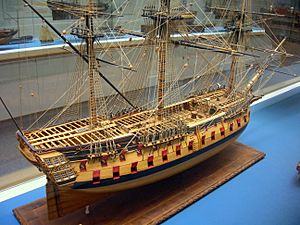HMS Hercules (1759) facts for kids

Model of a 74-gun ship, third rate, circa 1760. Thought to be either HMS Hercules or HMS Thunderer from 1760.
|
|
Quick facts for kids History |
|
|---|---|
| Name | HMS Hercules |
| Ordered | 15 July 1756 |
| Builder | Deptford Dockyard |
| Launched | 15 March 1759 |
| Fate | Sold out of the service, 1784 |
| General characteristics | |
| Class and type | Hercules-class ship of the line |
| Tons burthen | 160834⁄94 (bm) |
| Length | 166 ft 6 in (50.75 m) (gundeck) |
| Beam | 46 ft 6 in (14.17 m) |
| Depth of hold | 19 ft 9 in (6.02 m) |
| Propulsion | Sails |
| Sail plan | Full-rigged ship |
| Armament |
|
HMS Hercules was a powerful warship of the Royal Navy. It was a "ship of the line," which means it was a large warship designed for naval battles. This ship had 74 guns and was designed by a famous ship designer, Sir Thomas Slade.
Hercules was built at Deptford Dockyard by Adam Hayes. It was launched, meaning it touched the water for the first time, on March 15, 1759.
A Ship's Journey
HMS Hercules saw action in some very important naval battles. These battles helped shape history!
The Battle of Quiberon Bay
On November 20, 1759, Hercules was part of a huge fight. This was the Battle of Quiberon Bay, a major conflict between the British and French navies. It was a big victory for the British fleet.
The Battle of the Saintes
Years later, on April 12, 1782, Hercules joined Admiral Rodney's fleet. They fought against a French fleet in the Battle of the Saintes. Captain Henry Savage was in command of Hercules during this battle.
Hercules was an important ship in the British battle line. It was the first British ship to hit the French flagship, a very important enemy ship called the Ville de Paris.
Captain Savage was suffering from a painful illness called gout. He had to command the ship from an armchair on the main deck! Even after being injured during the battle, he returned to his chair in bandages to keep leading his crew. During this tough battle, six sailors on Hercules were killed and 18 were wounded.
End of Service
After its years of service, HMS Hercules was taken out of active duty in July 1783. It was then sold in Plymouth in March 1784 for £1300.
 | Jessica Watkins |
 | Robert Henry Lawrence Jr. |
 | Mae Jemison |
 | Sian Proctor |
 | Guion Bluford |

